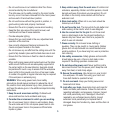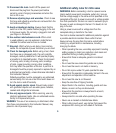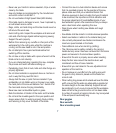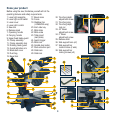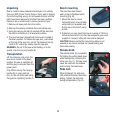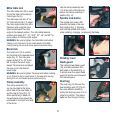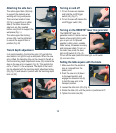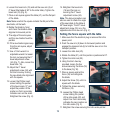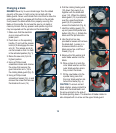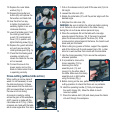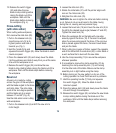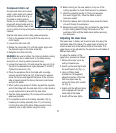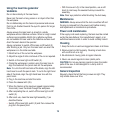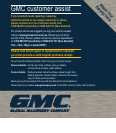
15
12. Replace the outer blade
washer (Fig. f).
13. Depress the spindle lock
button (26) and replace the
flat washer and blade bolt.
14. Use the 6mm hex key
to tighten the blade bolt
securely (tighten in an anti-
clockwise direction).
15. Lower the blade guard, hold
the rotating lower blade
guard (12) and blade bolt
cover (14) in position and
tighten the fixing screw (Fig. g).
16. Replace the guard retraction
arm and secure onto the
rotating blade guard (Fig. h).
17. Check that the blade guard
operates correctly and
covers the blade as the saw
arm is lowered.
18. Connect the saw to the
power supply and run the
blade to make certain that it
is operating correctly.
Cross-cutting (without slide action)
When cutting a narrow piece of
wood it is not necessary to use
the slide mechanism. In these
cases ensure that the slide lock
(29) is screwed down to prevent
the saw arm from sliding.
A crosscut is made by cutting
across the grain of the workpiece.
A 90º crosscut is made with the
mitre table set at 0º (Fig. i). Mitre
crosscuts are made with the table
set at some angle other than zero.
1. Pull on the release knob (6) and lift the saw arm (5) to its
full height.
2. Loosen the mitre lock (25).
3. Rotate the mitre table (21) until the pointer aligns with the
desired angle.
4. Retighten the mitre lock (25).
WARNING. Be sure to tighten the mitre lock before making
a cut. Failure to do so could result in the table moving
during the cut and cause serious personal injury.
5. Place the workpiece flat on the table with one edge
securely against the fence (18). If the board is warped,
place the convex side against the fence (18). If the
concave side is placed against the fence, the board could
break and jam the blade.
6. When cutting long pieces of timber, support the opposite
end of the timber with the side support bars (36), a roller
stand or a work surface that is level with the saw table.
7. Use the clamp assembly (10) to secure the workpiece
wherever possible.
8. It is possible to remove the
clamp assembly (10) by
loosening the clamp
assembly lock (11) and
moving it to the other side of
the table. Make sure the clamp
assembly lock is tight before
using the clamp (Fig. j).
9. Before turning on the saw, perform a dry run of the
cutting operation to check that there are no problems.
10. Hold the operating handle (7) firmly and squeeze
the switch trigger (24). Allow the blade to reach
maximum speed.
11. Press the release latch (35) and slowly lower the blade
into and through the workpiece.
f
g
h
i
j



